Ark Easy Way to Tame a Basilosaurus
![]()
Basilosaurus
1.0
May 24, 2018
Spawn Command
cheat summon Basilosaurus_Character_BP_C
or
cheat SpawnDino "Blueprint'/Game/PrimalEarth/Dinos/Basilosaurus/Basilosaurus_Character_BP.Basilosaurus_Character_BP'" 500 0 0 35
Variant X-Basilosaurus
cheat summon Ocean_Basilosaurus_Character_BP_C
or
cheat SpawnDino "Blueprint'/Game/Genesis/Dinos/BiomeVariants/Ocean_Basilosaurus/Ocean_Basilosaurus_Character_BP.Ocean_Basilosaurus_Character_BP'" 500 0 0 35
Data
No
Baby Time
11h 34m 26.667s
Juvenile Time
1d 22h 17m 46.667s
Adolescent Time
2d 9h 52m 13.334s
Total Maturation Time
4d 19h 44m 26.667s
Breeding Interval
18h - 2d
Habitat


Common Rare
Untameable Cave
The Basilosaurus is one of the creatures in ARK: Survival Evolved.
Basic Info [ ]
Dossier [ ]
This section is intended to be an exact copy of what the survivor Helena Walker, the author of the dossiers, has written. There may be some discrepancies between this text and the in-game creature.

"
Species
Basilosaurus solatiumfecit
Time
Late Eocene
Diet
Piscivore
Temperament
Passive
- Wild
One of the stranger creatures in the waters surrounding the Island is Basilosaurus solatiumfecit. It's a powerful swimmer which has adapted to the shallows so remarkably well that it rapidly recovers from injuries when near the water's surface. Conversely, it's vulnerable to deep water pressure, which slowly causes it harm. Basilosaurus is usually closely followed by other predatory creatures, as its eating habits leave plenty of scraps for scavengers to consume. It is a gentle creature towards humans and happily laps up food directly from them. However, the creatures that trail the "Basi" tend to become dangerously enraged whenever this occurs, as it leaves no leftovers for them.
- Domesticated
Despite the hassle of engaging with its ornery followers, many tribes still attempt to tame the Basilosaurus, as its mammalian, warm-blooded circulation provides a rider with perfect comfort from both heat and cold. Being apprehensive in nature, Basilosaurus is equipped with a defense mechanism that prevents it from being stunned or shocked. Alternatively, Basilosaurus is hunted (perhaps too vigorously) for its special blubber, which can be efficiently refined into gasoline!
„
Behavior [ ]
Unlike many other huge marine animals, the Basilosaurus is not aggressive and tolerates survivors and other animals unless attacked. When taming however, beware; when it eats it creates a cloud of red around its mouth (presumably blood) which will attract other animals near it, including aggressive Megalodon and Manta.
In the wild, it can often be seen peacefully strolling in shallow parts of the ocean, often with groups of ![]() Ichthyosaurus and
Ichthyosaurus and ![]() Manta to accompany it. Despite it's large size and diet it is harmless, excluding its grouping of Manta that surround it which will attack any aggressor to protect it. Ichthyosaurus will get spooked and swim away when the Basilosaurus is attacked.
Manta to accompany it. Despite it's large size and diet it is harmless, excluding its grouping of Manta that surround it which will attack any aggressor to protect it. Ichthyosaurus will get spooked and swim away when the Basilosaurus is attacked.
Appearance [ ]
The Basilosaurus is not actually a reptile despite its name, but a whale or cetacean. It has a long snake-like body that undulates through the seas of the ARK like the sea serpents of folklore and its head is like a crocodile, full of sharp teeth. It shares physical similarities with Orcas and Baleen Whales such as the Humpback or Blue Whale, though its body is significantly more serpentine and elongated when compared. A quirky feature of the Basilosaurus also includes its back flippers, small remnants of the hind limbs that in this animal still had a purpose. Its size seems roughly Mosasaurus-sized, although surprisingly it can fit through a dinosaur gate.
Color Scheme and Regions [ ]
This section displays the Basilosaurus's natural colors and regions. For demonstration, the regions below are colored red over an albino Basilosaurus. The colored squares shown underneath each region's description are the colors that the Basilosaurus will randomly spawn with to provide an overall range of its natural color scheme. Hover your cursor over a color to display its name and ID.
This information can be used to alter the Basilosaurus's regions by entering cheat SetTargetDinoColor <ColorRegion> <ColorID> in the cheat console. For instance, cheat SetTargetDinoColor 0 6 would color the Basilosaurus's "topside" magenta.

Region 0:
Topside

Region 1 is not used
for this Creature.

Region 2 is not used
for this Creature.

Region 3 is not used
for this Creature.

Region 4 is not used
for this Creature.
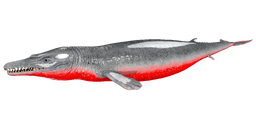
Region 5:
Underside
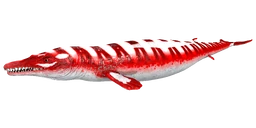
Region 0:
Main Body
14
28
29
35
45
47
48
49
50
51
52
53
54
55
56
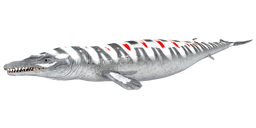
Region 1:
Glowing spots
5
7
23
25
28
30
31
32
40
45
47
48
49
50
51
52
53
54
55

Region 2 is not used
for this Creature.

Region 3 is not used
for this Creature.
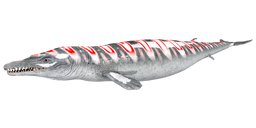
Region 4:
Glowing stripes
5
7
23
25
28
30
31
32
40
45
47
48
49
50
51
52
53
54
55
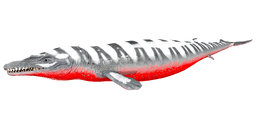
Region 5:
Lower body
14
28
29
35
45
47
48
49
50
51
52
53
54
55
56
Drops [ ]
- Harvest
- Guaranteed Special Loot
-
 Basilosaurus Blubber
Basilosaurus Blubber
Base Stats and Growth [ ]
| Movement [u/s] | Base Speed | Sprinting Speed | Stamina | ||||
|---|---|---|---|---|---|---|---|
| Wild | Tamed1 | Tamed2 | Wild | Tamed1 | Tamed2 | ||
| Walking | 300 | ? | ? | ? | ? | ? | 20 |
| Swimming | 300 | ? | ? | 420 | 1350 | 1350 | 3 |
- 1These are the base speeds of the creature at 100% Movement Speed.
- 2These are the speeds of the creature tamed and non-imprinted.
- For a comparison of the speeds of all creatures, see Base Creature Speeds.
| Blow Air | Stamina Cost | Attack Range | Description | ||||||||||
|---|---|---|---|---|---|---|---|---|---|---|---|---|---|
| Base | Minimum | Activation | |||||||||||
| 0 | 0 | 0 | 0 | ||||||||||
Wild Stats Level-up
Type in values of a wild creature to see on which stats it's emphasized. Green values on a high-level creature are very good for breeding. If you have already tamed your creature you can try to recover the breeding stats with an external tool.[1]
Basilosaurus
The stat-calculator does not work in the mobile-view, see here for alternatives: Apps
Note that after the creature is tamed it gets bonuses on some stats depending on the taming effectiveness. This makes it hard to retrieve the levels on a tamed creature, so this tool is only for wild ones, but gives a first impression, how well the stats are distributed.
Combat [ ]
This section describes how to fight against the Basilosaurus.
General [ ]
Basilosaurus are passive creatures and will not attack. They are, however, normally accompanied by large swarms of Mantas which can quickly shred an unprepared player and their mount. In mobile Basilosaurus oil is unable to refine. Lower levels are very worthy of killing, as they drop immense quantities of ![]() Oil.
Oil.
Strategy [ ]
Fighting one of these while it has a swarm around it should only be done so by a player who is prepared to have a large number of aggressive Mantas and potentially Megalodons swimming after them. As such, engaging in combat with a Basilosaurus without a mount or with a weak mount (i.e. Ichthy) is asking for trouble. An easy way to deal with the Mantas is to use a ![]() Baryonyx thanks to its spinning/stun move, which will help you a lot with cleaning them.
Baryonyx thanks to its spinning/stun move, which will help you a lot with cleaning them.
Weaponry [ ]
The best melee weapon to use is a sword, but the Basilosaurus will take some hits before it is dead. For ranged weapons, use a ![]() Crossbow. Or it can be killed with a
Crossbow. Or it can be killed with a ![]() Mosasaurus or a
Mosasaurus or a ![]() Megalodon very efficiently.
Megalodon very efficiently.
Dangers [ ]
While not being dangerous itself as its temperament is passive, it will usually be accompanied by a large group of Manta that will swarm the player if aggro is obtained by radius or aggression. Megalodon will often patrol the waters around Basilosaurus as well with a very large aggro range adding to the difficulty of the tame or kill. Being cautious around this animal is highly advised.
Weakness [ ]
Basilosaurus will take damage from swimming in deeper water and wild members alone will be unable to defend themselves.
Taming [ ]
Taming Food [ ]
Ingredients for ![]() Exceptional Kibble: 1 ×
Exceptional Kibble: 1 ×![]() Extra Large Egg, 5 ×
Extra Large Egg, 5 ×![]() Fiber, 1 ×
Fiber, 1 ×![]() Focal Chili, 10 ×
Focal Chili, 10 ×![]() Mejoberry, 1 ×
Mejoberry, 1 ×![]() Rare Flower, 1 ×
Rare Flower, 1 ×![]() Water Note that the values are for optimal cases, always bring extra supplies!
Water Note that the values are for optimal cases, always bring extra supplies!
For a level-dependent count of resources needed, try an external taming calculator.
Taming Strategy [ ]
Basilosaurus are passively tamed and are docile, they won't fight back even when attacked. However they can be incredibly difficult to tame for beginners who come unprepared. They are generally uncommon but found in great numbers around South Haven Island (Also known as Herbivore Island).
When not consistently fed, they will lose taming effectiveness very quickly. Towards the end of the process if there is a delay, you can be forced to start over, so Kibble, Prime Meat, and Soothing Balm(Mobile) are preferred over raw meat. (After first feed, they need to reduce food stat by 10% before you can feed again. Once this occurs the new feed cycle is every 10 secs)
Basilosaurus is also surrounded by swarms of Mantas, and the waters around the island are populated with Megalodons. Sharks are slow and can be evaded but Mantas will have little problem catching up to you. With these conditions it would be best to ride a fast and agile mount such as Icthyosaurus. You must feed the whale constantly and dart away when the predators surrounding it try to catch you. Another effective strategy is killing the manta with the Baryonyx's AoE tail spin ability. Monitor your oxygen stat, you don't have to have SCUBA gear as long as you have a fast mount but it will help. If you don't have anything to speed the process up it will take a long time, so make sure to tame during the morning. Just before you're finished, try to bait the predators to a different location. When fed, Basilosaurus spew what appears to be blood which attracts many tens of Megalodons and huge swarms of Mantas. The lowest leveled of Basilosaurus are remarkably powerful animals, so even though once tamed it will be targeted by all surrounding predators, it will have no trouble defeating them. When you are finished, lead the Basilosaurus close to a beach or shallow water. They are not known for being fast but they will keep up better than wild Megalodons and repel any threat that follows them.
Other semi aquatic mounts such as Kaprosuchus, Baryonyx, and Sarcosuchus will work as well. Sarcos in particular can lure a swarm of mantas to shore and repeatedly chase them down afterwards one by one to safely kill a swarm.
Utility [ ]
Roles [ ]
- Shock and Grab Immunity: Due to the Basilosaurus unique ability to resist being grabbed or shocked, movement impairing effects such as the
 Cnidaria and
Cnidaria and  Electrophorus stun and
Electrophorus stun and  Tusoteuthis grapple have no effect on them meaning they are free to attack without fear of being unable to escape, making them effective counters to said dangerous creatures. You may also note that Cnidaria do not deal any damage when shocking the Basilosaurus. This allows the Basilosaurus to take on certain roles that no other aquatic tames can do reliably.
Tusoteuthis grapple have no effect on them meaning they are free to attack without fear of being unable to escape, making them effective counters to said dangerous creatures. You may also note that Cnidaria do not deal any damage when shocking the Basilosaurus. This allows the Basilosaurus to take on certain roles that no other aquatic tames can do reliably. - Insulation: The Basilosaurus will protect the rider from extreme temperatures which can null the requirement for
 SCUBA Leggings for survivors with low Fortitude which means the rider can be more resilient if needed. This is shown as the status effect,
SCUBA Leggings for survivors with low Fortitude which means the rider can be more resilient if needed. This is shown as the status effect,  Insulation, which grants the player +562 hyperthermal protection and +562 hypothermal protection.
Insulation, which grants the player +562 hyperthermal protection and +562 hypothermal protection. - Bio Toxin Gatherer: As mentioned above, its immunity to shock damage from the
 Cnidaria make it one of the most reliable mass gatherers of
Cnidaria make it one of the most reliable mass gatherers of  Bio Toxin. Effectively being harmless to the whale, it can kill and eat massive amounts of the Cnidaria and harvest a great deal amount of Bio Toxin which can be especially useful for making
Bio Toxin. Effectively being harmless to the whale, it can kill and eat massive amounts of the Cnidaria and harvest a great deal amount of Bio Toxin which can be especially useful for making  Shocking Tranquilizer Darts.
Shocking Tranquilizer Darts. - Oil Supply:The Basilosaurus automatically generates and stores up to 20
 Oil (Tusoteuthis) which can be refined into
Oil (Tusoteuthis) which can be refined into  Gasoline. This is a great alternative to taming the more dangerous
Gasoline. This is a great alternative to taming the more dangerous  Tusoteuthis, at least for mid-level survivors. Killing one will also give you large amounts of oil, which preferably can come when hunting and killing wild whales or slaughtering whale babies.
Tusoteuthis, at least for mid-level survivors. Killing one will also give you large amounts of oil, which preferably can come when hunting and killing wild whales or slaughtering whale babies. - Ocean Caver: With its unique immunity to
 Electrophorus shocks,
Electrophorus shocks,  Cnidaria venom, and
Cnidaria venom, and  Tusoteuthis tentacle grapples, coupled with a naturally high
Tusoteuthis tentacle grapples, coupled with a naturally high  Health pool and a reasonable
Health pool and a reasonable  Melee Damage output; a well-bred, high leveled Basilosaurus essentially turns collecting the artifacts from ocean caves into a guarantee. With the extra assurance of a higher quality saddle, and the extra armor it provides, the Basilosaurus can easily deal with the potential alpha predator spawns in the caves as well. The whale's relatively smaller size, compared to other ocean heavyweights such as the
Melee Damage output; a well-bred, high leveled Basilosaurus essentially turns collecting the artifacts from ocean caves into a guarantee. With the extra assurance of a higher quality saddle, and the extra armor it provides, the Basilosaurus can easily deal with the potential alpha predator spawns in the caves as well. The whale's relatively smaller size, compared to other ocean heavyweights such as the  Mosasaurus and Tusoteuthis, ensures that it can take the rider directly to both artifacts without difficulty, even in The Caverns of Lost Hope, where a tight squeeze prevents larger mounts from reaching the artifact. The only thing the Basilosaurus does not have in its favor is that it takes constant, albeit slow and minimal, damage from being in the Deep Ocean region. While both ocean caves are contained within this region, the caves themselves have safe areas for the Basilosaurus to rest and heal if required, without fear of the constant deep water damage.
Mosasaurus and Tusoteuthis, ensures that it can take the rider directly to both artifacts without difficulty, even in The Caverns of Lost Hope, where a tight squeeze prevents larger mounts from reaching the artifact. The only thing the Basilosaurus does not have in its favor is that it takes constant, albeit slow and minimal, damage from being in the Deep Ocean region. While both ocean caves are contained within this region, the caves themselves have safe areas for the Basilosaurus to rest and heal if required, without fear of the constant deep water damage. - Ocean Master: All of its strength and immunity also makes the Basilosaurus the only mount to be able to be almost completely safe in all parts of the ocean. While other ocean mounts may be stronger, they are put at a serious disadvantage compared to the Basilosaurus due to its shock and grab immunity as well as its regeneration. Despite taking slight damage when submerged at a high enough depth, the danger this poses is more often than not trivial and acts little to stop the whale in the deep sea, though one must consider that when in deep water its regeneration ability does not work. But even so, the Basilosaurus is often regarded by many as the best ocean mount in the game.
- Battle Submarine: Despite it's lackluster
 Movement Speed, Basilosaurus makes for a perfect aquatic tank and war machine like the
Movement Speed, Basilosaurus makes for a perfect aquatic tank and war machine like the  Tyrannosaurus,
Tyrannosaurus,  Brontosaurus, and
Brontosaurus, and  Spinosaurus are on land. Their immunity to stings, high
Spinosaurus are on land. Their immunity to stings, high  Melee Damage, and very high
Melee Damage, and very high  Health allows them to take on multiple powerful predators and come out victorious. Couple this with the Basilosaurus' amazing ability to rapidly regenerate in shallow waters, and you got quite the powerful creature. This can be greatly utilized when mounted and soaking damage from creatures or
Health allows them to take on multiple powerful predators and come out victorious. Couple this with the Basilosaurus' amazing ability to rapidly regenerate in shallow waters, and you got quite the powerful creature. This can be greatly utilized when mounted and soaking damage from creatures or  Turrets. The only disadvantage is that their attack is focused directly to the front with a smaller than average AOE for its size and the whale also has a slow turn radius. But the damage dosage that cuts down Megalodons in a few bites is worth the trade. You can confidently leave a Basilosaurus alone for a long time as long as they have food and come back to them unharmed.
Turrets. The only disadvantage is that their attack is focused directly to the front with a smaller than average AOE for its size and the whale also has a slow turn radius. But the damage dosage that cuts down Megalodons in a few bites is worth the trade. You can confidently leave a Basilosaurus alone for a long time as long as they have food and come back to them unharmed. - Transport:: Though not the fastest sea creature, the Basilosaurus has great
 Weight stats and can carry lots of cargo from one place to another with ease. One can also rest assured with their goods on this creature, as the Basilosaurus is quite strong and tanky and can defend itself, you, and whatever cargo you have.
Weight stats and can carry lots of cargo from one place to another with ease. One can also rest assured with their goods on this creature, as the Basilosaurus is quite strong and tanky and can defend itself, you, and whatever cargo you have. - Hunter: As mentioned, Basilosaurus are fantastic battlers and travelers, thus one could even take out strong threats like Alpha Mosasaurs or the Dodorex with a mate boosted pair.
Note: Basilosaurus is totally immune to ![]() Electrophorus and
Electrophorus and ![]() Cnidaria shock. Their shock will not damage Basilosaurus or its rider.
Cnidaria shock. Their shock will not damage Basilosaurus or its rider.
Note: Some caution is advised when taking it into deep water; it will start to suffer 5-10 damage a second in deeper waters. While this damage is rather minuscule compared to that creature's health, it will prevent it from being able to naturally regenerate ![]() Health and could threaten low level Basilos, as well as cause problems if trying to store them near underwater bases. But if this does not apply, then little is to be worried about taking a Basilo into deep water.
Health and could threaten low level Basilos, as well as cause problems if trying to store them near underwater bases. But if this does not apply, then little is to be worried about taking a Basilo into deep water.
Collectibles [ ]
| Resource | Efficiency |
|---|---|
| | ? |
Spotlight [ ]
Notes / Trivia [ ]
For information pertaining specifically to the real-world Basilosaurus, see the relevant Wikipedia article.
- Basilosaurus was officially revealed by Susan Claire on March 24, 2016.[2]
- The dossier was revealed by Jat on March 28, 2016.[3]
- Its ability to generate oil is surprisingly fast. The oil has a spoil time, but it will take a long while for it to spoil so be sure to nab that oil once the quantity is near 20.
- As a primitive type of whale, Basilosaurus is the first marine mammal to be revealed in Ark.
- The dossier mentions the Basilosaurus being hunted "perhaps too vigorously" for its valuable blubber, which can be used as an excellent fuel source. This is a satirical reference to real-life whaling, which drove many species close to extinction due to the whale oil created from their blubber being used as fuel prior to the use of fossil fuels.
- The name Basilosaurus solatiumfecit roughly translates as "Regal reptile placed in consolation". The genus name stems from the fact that Basilosaurus was originally believed to be a marine reptile when first discovered, hence the saurus-suffix. The species name may refer to its ability to "console" its injuries when "placed" in shallow water.
- Unlike the game version, real Basilosaurus were aggressive apex predators. When hungry, they would ruthlessly kill and eat any animal they could get their jaws on and move on to the next. Additionally they were more than capable of traveling into shallow lakes and rivers, just like the game version, and attempt to attack any terrestrial prey that ventured too close to shores. But this is rare since their size would prevent them from defending against shallow water predators like crocodiles and sharks. Of course, if they behaved like this in the game taming them would be nearly impossible.
- The real Basilosaurus was also at the top of its food chain, sharing its environment of warm tropical sea habitat with and feeding upon other whales, aquatic mammals, sharks, turtles, and fish.
- The Basilosaurus will not attack by itself when in the "Damage layer" of the ocean. So take precaution when mounting off if it is the only fending mount you have. This may be a bug since it sometimes refused to attack above the "Damage layer."
- In the map ARK Ragnarok, several beached Basilosaurs can be found all along the east beaches and can be harvested for
 Hide,
Hide,  Keratin,
Keratin,  Oil and
Oil and  Spoiled Meat.
Spoiled Meat. - Rather fascinating when compared to modern whales and dolphins, the Basilosaurus had visible hind limbs that are much more intact compared to the hind limb remnants found in modern cetacean skeletons. Due to their small size and limited strength from lack of a hip-to-spine connection, it is unlikely that the hind limbs had any role in locomotion, though a popular theory states that they may have been used to assist in mating, acting like claspers to attach the long bodies of each partner and allow successful copulation.
- The hind limb bones that are left in modern cetaceans are completely useless as limbs, as they are kept deep internally in the body and are reduced to a pelvis and usually a femur, sometimes having even more leg bones intact. However, the long thought belief that these structures were vestigial couldn't be further from the truth. Amazingly, just like how the hind limbs probably had a purpose aiding in sex for the Basilosaurus, the hind limbs/hip of today's cetaceans also serve a sexual purpose as well. In fact, the sexual organs of modern whales are anchored to these bones and rely on them for the much needed stability that the challenge of copulating in the water creates. Particularly noteworthy, the males have larger pelvic bones than the females.
- The Basilosaurus makes a good depth gauge for determining whether squids and mosas will attack the player. They start taking crush damage at both species' swim ceiling.
- The Basilo
 Insulation buff is also shared by the
Insulation buff is also shared by the  Ferox.
Ferox. - They spawn quite a lot around Herbivore Island
- If given the console command "infinitestats" in the "Damage Layer" it will die instantly.
- Basilosaurus doesn't produce
 Feces.
Feces. - Whales are mammals and like all mammals they breathe air. Real world Basilosaurus would need air but like many aquatic creatures in Ark the Basilosaurus has no
 Oxygen stat and thus can stay underwater indefinitly.
Oxygen stat and thus can stay underwater indefinitly. - In the Valguero official map, the Basilosaurus will not take damage in The Abyss despite its depth. This makes it especially powerful on this particular map.
- A Basilosaurus is guaranteed to drop
 Basilosaurus Blubber when killed.
Basilosaurus Blubber when killed. - Real Basilosaurus' would not have had too much blubber on their bodies due to their habitat being in warm tropical water, being comparable to that of tropical dolphin species.
- If a player isn't careful, an unmounted Basilosaurus traveling in rivers can get beached and die. This may happen when traveling up river with a raft. Make sure to whistle the whale to stop and keep it somewhere where it's mostly in water and can move around well. If it gets caught up within rocks, destroy them quickly and turn back.
- If a player uses two different foods to tame, the taming progress resets.
- The basilosaurus in ark is immune to grab damage from a Tusoteuthis and shock damage from both Cnidaria and Electrophorus, whereas a modern day whale would be grappled by a modern day squid and would also be badly shocked by a massive group of modern day jellyfish and electrical eels.
- Comparing the fact that the Ark Basilosaurus would die in deep waters, whereas a modern day sperm whale would have no depth limit, but both share a same trait: the ark basilosaurus has a depth like any other modern day whale would have.
- The basilosaurus can be knocked out however if it's knocked out it cannot be tamed this is similar to many other passive tames in the game.
Changelog [ ]
| Patch | Changes |
|---|---|
| 254.0 | |
| 254.6 |
|
| 260.0 |
|
| 264.52 | |
| 306.41 Genesis: Part 1 Expansion Release | Added the |
| 312.65 |
|
Gallery [ ]
-

Basilosaurus can jump out of the water.
-
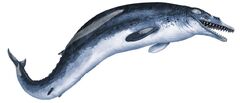
-

References [ ]
- ↑ ARK Smart Breeding
- ↑ as promised, the Basi is on the way :)
- ↑ Introducing the Basilosaurus!
| Creatures | |||||||||||||||||||||||||||||||||||||||||||||||||||||||||||
|---|---|---|---|---|---|---|---|---|---|---|---|---|---|---|---|---|---|---|---|---|---|---|---|---|---|---|---|---|---|---|---|---|---|---|---|---|---|---|---|---|---|---|---|---|---|---|---|---|---|---|---|---|---|---|---|---|---|---|---|
| |||||||||||||||||||||||||||||||||||||||||||||||||||||||||||
Source: https://ark.fandom.com/wiki/Basilosaurus

































































































































































































































































